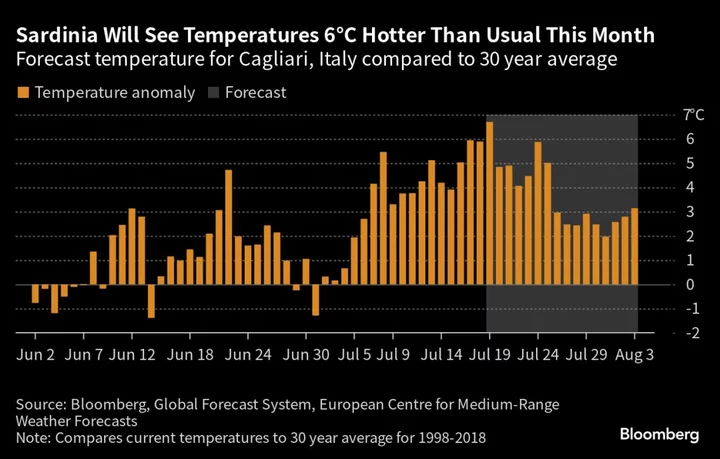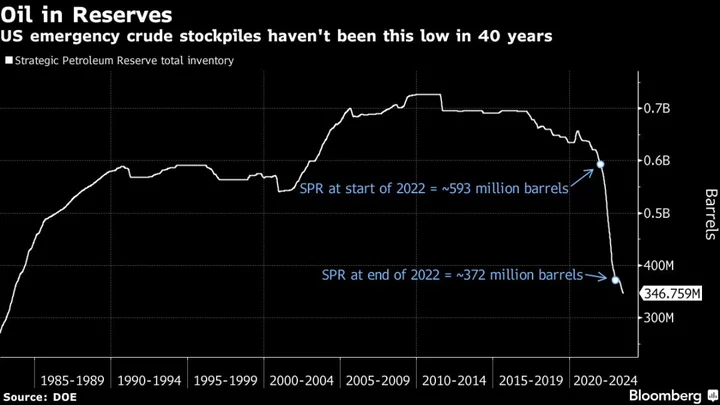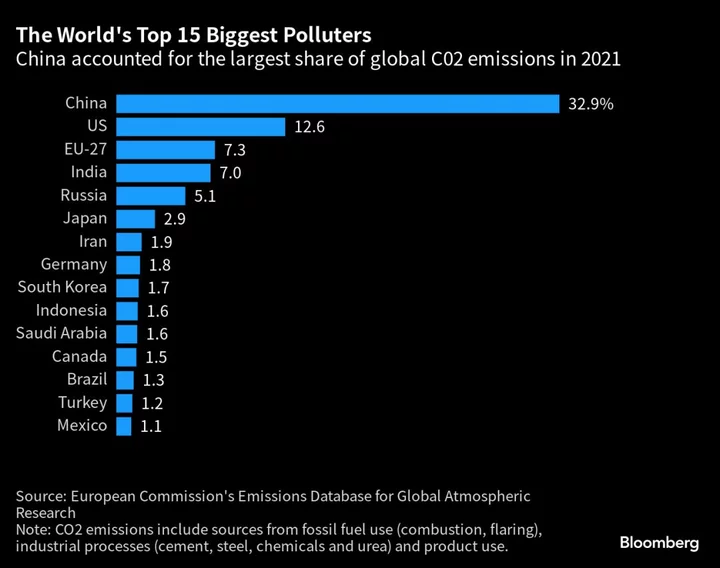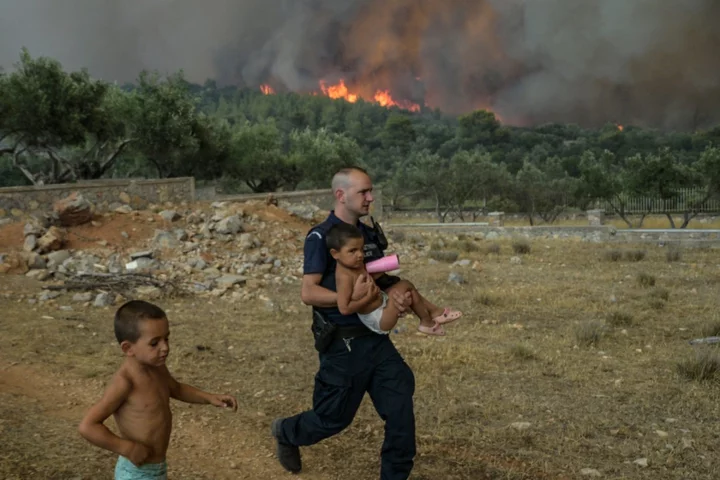
Chile Taps Global Markets for Sustainability-Linked Peso Bonds
Chile is once again tapping international bond markets with a deal that hinges on lower greenhouse gas emissions
1970-01-01 08:00

NYC Comptroller Blasts BlackRock for Picking Aramco CEO for Board
New York City Comptroller Brad Lander slammed a decision by BlackRock Inc., its biggest external money manager, to
1970-01-01 08:00

Sizzling 115F Heat Is Killing Phones in Italy's Sardinia Island
Mobile phones that die while shooting a video. Cars that roast on the inside. A thermometer needle that
1970-01-01 08:00

US envoy John Kerry says China-US climate relations need 'more work'
By Valerie Volcovici and David Stanway BEIJING (Reuters) -U.S. climate envoy John Kerry said more work was needed to iron
1970-01-01 08:00

US Oil Reserve Sales to China Could Be Blocked in Defense Bill
China would be blocked from purchasing oil from the US’s emergency stockpiles under legislation slated for a Senate
1970-01-01 08:00

The Australian climate protesters cast as extremists
Activists say they're being labelled as threats to public safety to justify heavy-handed policing.
1970-01-01 08:00

John Kerry Says the US and China Need More Time to Break Ground on Climate
Washington and Beijing need more time to “break new ground” on combating global warming, US climate envoy John
1970-01-01 08:00

First Southern Hemisphere Direct Air Capture Plant Planned
Octavia Carbon and Cella Mineral Storage have agreed to build the first direct air capture plant in the
1970-01-01 08:00

World’s Second-Biggest Carbon Credit Project Halted by Legislative Hiatus
The world’s second-biggest carbon-credits project has halted its operations after the government of Zimbabwe said earlier this year
1970-01-01 08:00

EU Lawmakers Ease Concerns on Electricity Market Intervention
European Union lawmakers allayed market concerns over a possible revenue cap on renewable power producers, an emergency measure
1970-01-01 08:00

What is driving the record-breaking global heatwaves across three continents?
Historic heatwaves are sweeping the planet from China to Europe and the United States, with 2023 on track to become the hottest year on Earth since records began. Rome and Catalonia on Tuesday recorded their highest temperatures ever, provisional data suggests, as southern Europe is gripped by extreme heat and wildfires. Meteorologists predict this week Europe can record its highest temperature ever as parts of Italy are forecast to cross 48C (118.4F). Meanwhile, China has already recorded its highest-ever temperatures with a scorching 52.2C (125.9F) recorded in Sanbao on Sunday as the country is hit by multiple climate disasters at once. The same day, Death Valley in the US recorded 53C (127.4F), as meteorologists say it is close to setting a new record for the highest temperatures ever recorded on Earth amid blistering heat gripping large parts of the southern states. This onslaught of heat from Asia to the Americas is just the latest in the series of climate extremes we have witnessed this year with the first week of July being recorded as the hottest days on the planet and ocean temperatures reaching record highs. So what is causing these extreme temperatures and is there a link between all the heatwaves the planet is currently experiencing? According to experts, a combination of factors are contributing to these extreme weather events including stagnant weather systems and the El Nino phenomenon. However, the driving forces behind the heatwaves are primarily linked to the climate crisis. Scientists say high-pressure systems are dominating Europe, central Asia and the southern US, leading to these regions experiencing heatwave conditions. The hotter-than-usual ocean waters are also contributing to rising temperatures over land. “The bubble of hot air that has inflated over southern Europe has turned Italy and surrounding countries into a giant pizza oven,” Professor Hannah Cloke of University of Reading, says. “The hot air which pushed in from Africa is now staying put, with settled high pressure conditions meaning that heat in warm sea, land and air continues to build.” Dr Akshay Deoras, meteorologist at the University of Reading, says while it isn’t unusual for the northern hemisphere to experience heat at this time of the year, the temperatures seen in Europe are definitely unusual. “Heatwaves are common in the northern hemisphere at this time of year. However, the temperatures we are expecting in parts of southern Europe in the coming days are what we normally get in the tropical deserts or tropical countries such as India, Pakistan or the Middle East during summer,” Dr Deoras says. “The simultaneous occurrence of heatwaves in different regions of the world as well as their forecasted intensity fits well with the anticipated impact of climate change on global temperatures.” Dr Melissa Lazenby, senior lecturer in climate change at the University of Sussex, said the weather extremes being experienced across the globe are “exactly what climate scientists have been predicting” as a result of the man-made climate crisis. “The northern hemisphere is experiencing a combined effect of both natural and anthropogenic climate change resulting in extreme heat over three NH [northern hemisphere] continents,” Dr Lazenby said. According to the United Nations’ top science body, the world has become hotter by approximately 1.2C (34.1F) since the 1800s due to the greenhouse gases released by burning fossil fuels. Scientists say the heat brought by a natural phenomenon like El Nino comes on top of the existing heat the planet is experiencing due to greenhouse gas emissions, hence, raising the temperatures higher than they would have in a world without man-made pollution. “There is a developing El Nino event as well as the additional warming from human emissions, therefore, resulting in abnormally warmer temperatures than without human emissions,” Dr Lazenby said. Professor Cloke adds: “It is not surprising that different parts of the northern hemisphere have heatwaves during our summer months, but the combined picture is starting to look like climate change impacts all happening at the same time, as scientists have forecast for decades. “We are now living through these impacts, rather than predicting them in a computer simulation of the future climate.” Alarms were raised by the World Meteorological Organization (WMO) earlier this year about the unprecedented warming the planet could experience once the El Nino cycle begins. The WMO said there is a 98 per cent likelihood that “at least one of the next five years, and the five-year period as a whole, will be the warmest on record”. However, since then, several heat records have been broken. Even before the weather phenomenon could start in full swing, June was the hottest month recorded for the planet, according to Berkley Earth, an independent organisation that maintains monthly temperature records. The researchers at the California-based independent organisation have said there is an 80 per cent chance this year could be the hottest on record for the planet. Ocean temperatures have also been breaking records with parts of the North Atlantic,. especially waters around the UK and Ireland experiencing an “unprecedented” marine heat wave, with temperatures up to 5C (41F) hotter than usual. “The El Nino gathered momentum since May this year and its effects have already kicked in with significant anomalies in upper-surface sea temperatures in the Pacific,” Dr Malcolm Mistry, assistant professor in climate and geo-spatial modelling, London School of Hygiene & Tropical Medicine, said. “This in turn is known to disturb wider weather patterns not only in the Pacific, but also globally such as over Eastern US and parts of Europe, Africa and Asia.” El Nino is still in its developing stages and it typically peaks in the months of December to February. Scientists say, there is likely more extreme events and heat to come globally as it kicks in. “As per current seasonal forecasts, the El Niño is expected to strengthen and its effects to remain persistent till the rest of the year,” says Dr Mistry. According to Dr Deoras, El Niño is “still weak and in its early stages of development”. “Its effect on the global weather patterns will become more robust in the coming months,” he adds. This year’s heatwave comes as a repeat of the devastation experienced last year in all three continents, when Asia, Europe and the US all suffered through scorching heat. Scientists say with heatwaves becoming more frequent and prolonged, more immediate measures are needed to protect vulnerable population and cut down planet-warming greenhouse gas emissions immediately. “Scientists have shown that such heatwaves are occurring more often with climate change, and with El Nino conditions this year we are likely to see many more temperatures records broken in the coming months,” says Dr Vikki Thompson, climate scientistat the Royal Netherlands Meteorological Institute. “Heatwaves will continue to increase in intensity, frequency, and duration unless we reduce greenhouse gas emissions drastically.” Read More 2023 is set to be hottest on record amid global heatwaves, scientists say Why is there no UK heatwave as Europe swelters during Charon? 11 pictures that capture the devastation of climate crisis as heatwave sweeps Europe Heatwave map 2023: Temperatures set to soar in Italy, Spain and Greece due to Charon heatwave Incredible satellite images reveal extent of heatwave across Europe Arizona driver claims extreme heat melted her car light
1970-01-01 08:00

Chef Andrew Zimmern Is Fighting Hunger Caused by Climate Change
“Recently, I was talking to a fisherman in a small town in Italy. His family has been fishing
1970-01-01 08:00
